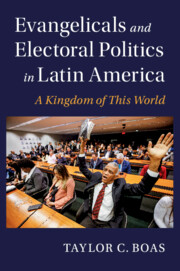46 results
Who Participates in Focus Groups? Diagnosing Self-Selection
-
- Journal:
- PS: Political Science & Politics , First View
- Published online by Cambridge University Press:
- 05 April 2024, pp. 1-6
-
- Article
-
- You have access
- Open access
- HTML
- Export citation
Religion, Sexuality Politics, and the Transformation of Latin American Electorates
-
- Journal:
- British Journal of Political Science , First View
- Published online by Cambridge University Press:
- 04 December 2023, pp. 1-20
-
- Article
-
- You have access
- Open access
- HTML
- Export citation
Preface
-
- Book:
- Evangelicals and Electoral Politics in Latin America
- Published online:
- 27 January 2023
- Print publication:
- 26 January 2023, pp xv-xviii
-
- Chapter
- Export citation
Acknowledgments
-
- Book:
- Evangelicals and Electoral Politics in Latin America
- Published online:
- 27 January 2023
- Print publication:
- 26 January 2023, pp xix-xxii
-
- Chapter
- Export citation
1 - Explaining Evangelical Representation
-
- Book:
- Evangelicals and Electoral Politics in Latin America
- Published online:
- 27 January 2023
- Print publication:
- 26 January 2023, pp 1-50
-
- Chapter
- Export citation
References
-
- Book:
- Evangelicals and Electoral Politics in Latin America
- Published online:
- 27 January 2023
- Print publication:
- 26 January 2023, pp 267-306
-
- Chapter
- Export citation
Index
-
- Book:
- Evangelicals and Electoral Politics in Latin America
- Published online:
- 27 January 2023
- Print publication:
- 26 January 2023, pp 307-317
-
- Chapter
- Export citation
Dedication
-
- Book:
- Evangelicals and Electoral Politics in Latin America
- Published online:
- 27 January 2023
- Print publication:
- 26 January 2023, pp vii-viii
-
- Chapter
- Export citation
Figures
-
- Book:
- Evangelicals and Electoral Politics in Latin America
- Published online:
- 27 January 2023
- Print publication:
- 26 January 2023, pp xi-xii
-
- Chapter
- Export citation
6 - Cleavages and Political Ambivalence in Peru
-
- Book:
- Evangelicals and Electoral Politics in Latin America
- Published online:
- 27 January 2023
- Print publication:
- 26 January 2023, pp 182-216
-
- Chapter
- Export citation
Contents
-
- Book:
- Evangelicals and Electoral Politics in Latin America
- Published online:
- 27 January 2023
- Print publication:
- 26 January 2023, pp ix-x
-
- Chapter
- Export citation
Frontmatter
-
- Book:
- Evangelicals and Electoral Politics in Latin America
- Published online:
- 27 January 2023
- Print publication:
- 26 January 2023, pp i-vi
-
- Chapter
- Export citation
3 - Growth, Diversity, and Political Theology
-
- Book:
- Evangelicals and Electoral Politics in Latin America
- Published online:
- 27 January 2023
- Print publication:
- 26 January 2023, pp 84-111
-
- Chapter
- Export citation
5 - Comfort and Political Quiescence in Chile
-
- Book:
- Evangelicals and Electoral Politics in Latin America
- Published online:
- 27 January 2023
- Print publication:
- 26 January 2023, pp 149-181
-
- Chapter
- Export citation
7 - Conclusions and Comparative Perspectives
-
- Book:
- Evangelicals and Electoral Politics in Latin America
- Published online:
- 27 January 2023
- Print publication:
- 26 January 2023, pp 217-250
-
- Chapter
- Export citation

Evangelicals and Electoral Politics in Latin America
- A Kingdom of This World
-
- Published online:
- 27 January 2023
- Print publication:
- 26 January 2023
2 - Voting Behavior and Political Institutions
-
- Book:
- Evangelicals and Electoral Politics in Latin America
- Published online:
- 27 January 2023
- Print publication:
- 26 January 2023, pp 51-83
-
- Chapter
- Export citation
Tables
-
- Book:
- Evangelicals and Electoral Politics in Latin America
- Published online:
- 27 January 2023
- Print publication:
- 26 January 2023, pp xiii-xiv
-
- Chapter
- Export citation
Appendix A - Data Sources
-
- Book:
- Evangelicals and Electoral Politics in Latin America
- Published online:
- 27 January 2023
- Print publication:
- 26 January 2023, pp 251-266
-
- Chapter
- Export citation
4 - Threats and Political Engagement in Brazil
-
- Book:
- Evangelicals and Electoral Politics in Latin America
- Published online:
- 27 January 2023
- Print publication:
- 26 January 2023, pp 112-148
-
- Chapter
- Export citation



